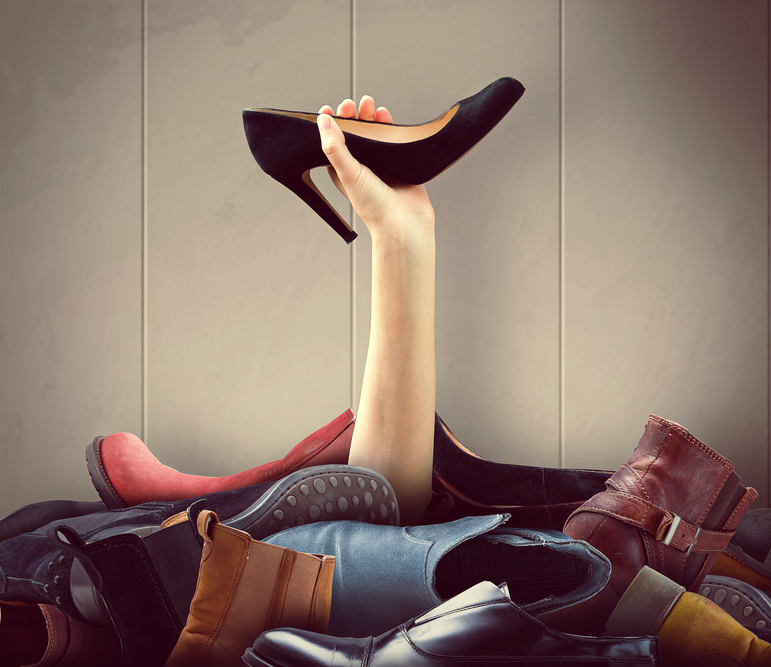Dom Cadden
While some people agree that shopping can be better than sex, many psychologists are warning that for some,a little credit card craziness can tip over the edge into a destructive compulsive behaviour that is, in fact, best associated with sex addiction.
The problem for shopping addicts is that overspending is often seen as the height of self-indulgence, and there’s not much wrong with that, or so goes the thinking. Even drinking, drug and gambling addicts seem to attract more sympathy and acceptance as a problem beyond the sufferer’s control. In fact, despite a push by an increasing number of psychologists and academics studying oniomania, to use the correct medical term, the condition is still not listed in the Diagnostic and Statistical Manual, the American register of all currently accepted and recognised mental health conditions. Instead it retains the rating of obsessive compulsive disorder.
“It comes down to disability,” says Carl Zabel, who conducted a three-year study at the University of Melbourne into psychological factors underlying compulsive buying.
“It’s not how much people spend or how much time they use for their shopping that pushes them into this category, it’s about the extent of disability or dysfunction it causes their lives,” Zabel says.
When sex addicts are overwhelmed by intolerable feelings, they will use sex as a mechanism to feel good about themselves. Shopping addicts do the same through buying.
John Falcon, psychologist and addiction specialist
So while a Hollywood celebrity can spend $12,000 on a few skimpy outfits and consider it nothing more than a weekly hobby, if Maggie the checkout chick does the same, her world is thrown into chaos (although she’ll look fah-bu-lous).
While the rise of e-commerce has seen a spike in compulsive buying among men, shopping addiction is still mostly associated with women.
“For women, shopping is often a pleasant activity that is gratifying and is part of the socialisation process,” Zabel says.
“If we say compulsive behaviour is a way of dealing with unwanted emotion, or making yourself feel better, then men tend to go for other activities at risk of addiction, such as gambling or drinking.”

Psychologist John Falcon has directed programs for several addiction treatment facilities in Australia and the USA, including South Pacific Private Hospital on Sydney’s Northern beaches, which conducts treatment programs for compulsive spending.
“Shopping addiction can be closely related to sex addiction,” he says. “Both are similar in their compulsive behaviour and an inability to delay gratification. When sex addicts are overwhelmed by intolerable feelings, they will use sex as a mechanism to feel good about themselves. Shopping addicts do the same. With both addictions, there are secrets that people feel a lot of shame about. We want them to expose those secrets to themselves first and then communicate them to family members so that it’s all out in the open.”
Falcon says that as with other recognised addictions, he considers compulsive shopping a brain disease. “When they’re buying something their brain lights up and they get that endorphin-driven,natural opiate sort of feeling, and they’ve trained their brain to think that this is the way they have to do it.”
…men tend to go for other activities at risk of addiction, such as gambling or drinking.
Carl Zabel, psychologist
Sufferers even express the same kind of physical withdrawal symptoms commonly associated with other addictions such as depression, sweating and even hallucinations.
For Olinda, 23, a student from regional Victoria working part-time, withdrawal meant a feeling of “constant suffocating” after two weeks without shopping.
“It’s like shopping helps me to breathe,” she says.
Kim, 34, describes herself as “degree qualified, ex-professional and smart”. She says that still, six years after her “lowest point” (when her credit card debt amounted to $70,000), she can only hope her brain will one day turn off its constant thinking about shopping.
“I have seen the most amazing places – France, Switzerland, Spain, Greece, Belgium, Germany – but the only thing I think about is, ‘What can I buy here?’”
As with many addictions, the family and friends are inevitably drawn in, especially with compulsive shoppers’ tendency for secrets and feelings of shame. “I used to feel guilty when I went home and had to sneak things into the house,” says Lisa, 28,a corporate account executive. Lisa would hide her purchases – usually clothes– then open them much later in private. Sometimes she would go two months before she wore her new clothes for fear of what the family would say, then tell them that someone gave it to her as a present. At its worst, Lisa’s debt across four credit cards amounted to about 55 per cent of her salary.

Karyn Bosnak became the world’s most renowned shopping addict, thanks to media coverage about her website and book, Save Karyn. In 2001 Bosnak moved from Chicago to a US$100,000 TV production job in New York, but within months she ran up an enormous debt on her American Express and other credit cards.
“New York is a tough city. If the women aren’t beautiful, they’re intelligent, and they all look fabulous,” says Bosnak. “I felt that I didn’t fit in. I felt young, immature, nervous and out of my league.”
Very soon, Bosnak found herself compensating for her insecurity. “I really believe that if you look the part, it sets you up for the job, so I would buy things to make me feel more confident,” she says. “Then there was the revenge factor – I was working very hard so when I bought something I couldn’t afford, I was like, ‘You know what? I work hard, and I deserve it.’ I was really unhappy in my new job, but I felt trapped because there was all this money. I wanted to quit, I went on interviews, but it became clear that I couldn’t find a job that would pay as much so that I could afford my rent, my spending and my debts. That’s when I realised that I was totally out of control.”
After losing her job and consolidating her debt, Bosnak created a website, www.savekaryn.com, where she frankly explained her situation and asked people to help pay her debt. Unsurprisingly, she received a barrage of incredulous and abusive emails. Why did she put up with it?
“I kept getting money.” In 20 weeks, she paid off her debt.
The problem for shopping addicts is that overspending is often seen as the height of self-indulgence, and there’s not much wrong with that, or so goes the thinking. Even drinking, drug and gambling addicts seem to attract more sympathy and acceptance.
The revenge factor in Bosnak’s spending features prominently in Women as Addictive Consumers, a study published by Dr Sue Eccles from the University of Lancaster (UK) in 2002.
“Evidence suggests that women shop when they are fed up, they buy something in spite of or because of their relationship with their partner, or they seek to create some kind to meaning to their lives through their shopping,” Dr Eccles says.
Her study classified female shopping addicts into four groups that often cross over each other:
- mood repair addict
- revenge addict
- serial addict; and
- existential addict
Revenge addicts
This group may have experienced a flawed personal relationship that brought on a need to “get back” at a partner or family member, even though their behaviour is kept a secret. They may also feel patronised or unimportant, and shopping may be seen as an exciting or even slightly dangerous event – one of the few situations in their life where they feel in control. John Falcon also notes that many addicts come from families where money issues were prevalent while they were growing up.
Serial addicts
These are people who have gone from one addiction to another, or share shopping addiction with another addiction (such as alcoholism) at the same time. Falcon draws a similar parallel with other ‘control issues’.
“We see many women who have an eating disorder such as anorexia or bulimia, and they have an addiction to shopping as a way of working out their anxiety,” he says. “A shopping addict justifies going to a sale or buying something in much the same way as an anorexic or bulimic who will say, ‘How many calories am I eating and what do I have to do in terms of exercise or elimination in order to cancel out those calories’. Sales become a green light to purchase things without guilt, and lay-buy a rationale to tell themselves that they’re not really being impulsive.”
Existential addicts
This group consider themselves expert shoppers and may even buy on behalf of others. They are very discerning and can, for example, spend inane amounts of time searching for the perfect buy. People in this category often described their shopping as “missions” which they found exhausting, but gave a sense of meaning to their lives.
Existential shoppers may also feel justified buying just because something is on sale or because they are buying for other people.
“There was one Christmas a few years back when I would spend all of every pay cheque,” says Lisa. “I was buying presents for other people, but also myself. I would say, ‘OK, now I’ve bought presents for everyone else, I’ll spoil myself’. Sometimes I would buy two of something just because I wanted one for me.”
Mood repair addicts
This final category is perhaps the easiest to identify – they feel a need to spend money or buy new things when they are unhappy, troubled or anxious. They may spend more than they can afford on services that give them attention and lift their self-esteem. These often include high-end hairdressers, beauty treatments, cosmetic surgery and personal trainers. What begins as a short-term coping mechanism builds to a longer-term addiction. What starts as a way to relieve stress and anxiety can lead to depression and even greater anxiety.
Dr Eccles notes that, “the mood repair, revenge and serial addicts all had issues to a greater or lesser extent of low self-esteem.”
Anxiety, self-esteem and addiction are often linked. People worry about fitting in and how others will judge them, but their spending – now often broadcast on social media – can bring their self-esteem up when they receive comments and compliments.

While shopping may temporarily repair mood, it certainly never does any good for personal finances. Some people become obsessive about work if it means they’ll earn more money for shopping. Others resort to less honourable methods. At her worst, Karyn Bosnak devised what she termed the ‘Buy and Return Credit Payment Management Plan’. Bosnak had discovered that if she bought something – anything – just before her minimum monthly credit card payment was due, then returned the item immediately, the credit from the return would appear before the debit from the purchase, thereby meeting the minimum payment required on her bill.
“I was happy to find a way to avoid paying off the whole balance, but although it wasn’t technically illegal, I felt like I was stealing. I was scared and I felt sick to my stomach every time I did it.”
Bosnak is happily reformed now, but like any other former addict, she still has her demons to battle. She never attempted to get another American Express card, but then her publisher, HarperCollins, sent her on a promotional tour for her book… and gave her an Amex card.
“It made me wonder if my publisher had ever read my book!” Bosnak says. “Then my editor explained that it could only be used for transportation and at hotels. There was still this voice in my head saying that there was sure to be a way to use it at hotel gift shops so that the charge would just come up as ‘hotels’.”
“But I didn’t.”
This is an updated and revised version of articles that were published in Madison magazine and Femina (South Africa).
Bye-buy problems – 5 tips to control compulsive spending
Avoid carrying credit cards – in fact, get rid of them where possible. Only shop with cash or debit cards.
When you need to do grocery shopping, avoid supermarkets that are in a big mall or shopping centre.
Try working out a weekly allowance and shop only from a list of things that you leave home intending to buy.
Avoid lay-buy – this is just a way to fool yourself into thinking that you’re not being impulsive.
“Know your total debt and hang it on the wall,”Karyn Bosnak says. “Then instead of telling yourself that you deserve to go out to dinner, you see the debt and stay in and use the money you would have spent at dinner towards an extra payment.”





